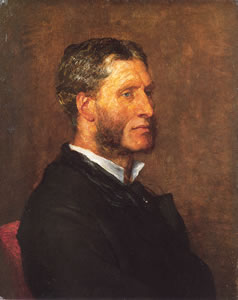|
De Engelse dichter en cultuurcriticus Matthew Arnold werd geboren op 24 december 1822 in Laleham, Middlesex. Hij bezocht vanaf 1837 de Rugby School en studeerde vervolgens aan de universiteit van Oxford. Met zijn vroege poëzie won hij een aantal prijzen. In Oxford was hij bevriend met de latere katholieke kardinaal John Henry Newman. Vroeg gaf hij blijk van zijn enthousiasme voor de Franse cultuur, vrij ongewoon voor een Brit deze tijd. Arnold studeerde in 1844 af. Vanaf 1847 was hij prive-secretaris van Lord Lansdowne, een invloedrijk politicus. 1851 Arnold trouwde met Frances Lucy Wightman, dochter van een rechter. Door de bemiddeling van Lansdowne in hetzelfde jaar kreeg hij een baan als een school-inspecteur. Uit hoofde van zijn beroep reisde Arnold in de daaropvolgende jaren veel, bezocht Frankrijk, Nederland, Zwitserland en Duitsland. In 1849 Matthew publiceerde Arnold zijn eerste dichtbundel, in 1852 volgde met "Empedocles on Etna," de tweede bundel. Pas vanaf 1853 publiceerde hij poëzie onder zijn echte naam In 1857 werd Arnold hoogleraar literatuur in zijn geliefde Oxford. Hij was een van de eerste die zijn colleges niet in het Latijn gaf. Uit zijn lezingen kwamen de boeken On Translating Homer (1861, 1862) en On the Study of Celtic Literature (1867) voort. Een belangrijke bijdrage aan een nieuwe vorm van culturele kritiek werden zijn werken Essays in Criticism (1865) en Culture and Anarchy (1869).xml:namespace prefix = o ns = "urn:schemas-microsoft-com:office:office" />
Dover Beach
The sea is calm to-night.
The tide is full, the moon lies fair
Upon the straits; on the French coast the light
Gleams and is gone; the cliffs of England stand;
Glimmering and vast, out in the tranquil bay.
Come to the window, sweet is the night-air!
Only, from the long line of spray
Where the sea meets the moon-blanched land,
Listen! you hear the grating roar
Of pebbles which the waves draw back, and fling,
At their return, up the high strand,
Begin, and cease, and then again begin,
With tremulous cadence slow, and bring
The eternal note of sadness in.
Sophocles long ago
Heard it on the A gaean, and it brought
Into his mind the turbid ebb and flow
Of human misery; we
Find also in the sound a thought,
Hearing it by this distant northern sea.
The Sea of Faith
Was once, too, at the full, and round earth's shore
Lay like the folds of a bright girdle furled.
But now I only hear
Its melancholy, long, withdrawing roar,
Retreating, to the breath
Of the night-wind, down the vast edges drear
And naked shingles of the world.
Ah, love, let us be true
To one another! for the world, which seems
To lie before us like a land of dreams,
So various, so beautiful, so new,
Hath really neither joy, nor love, nor light,
Nor certitude, nor peace, nor help for pain;
And we are here as on a darkling plain
Swept with confused alarms of struggle and flight,
Where ignorant armies clash by night.

Matthew Arnold (24 december 1822 - 15 april 1888)
Portret door George Frederick Watts, 1880
|



